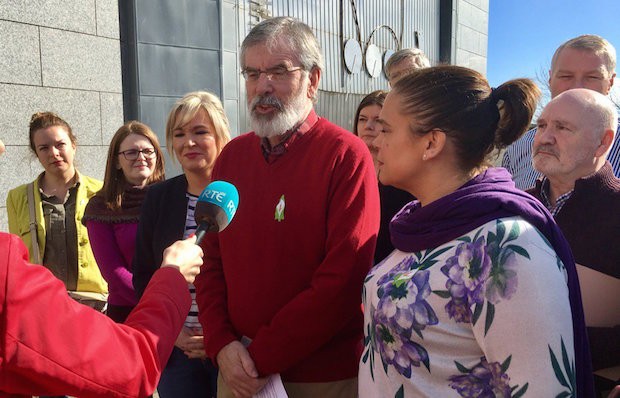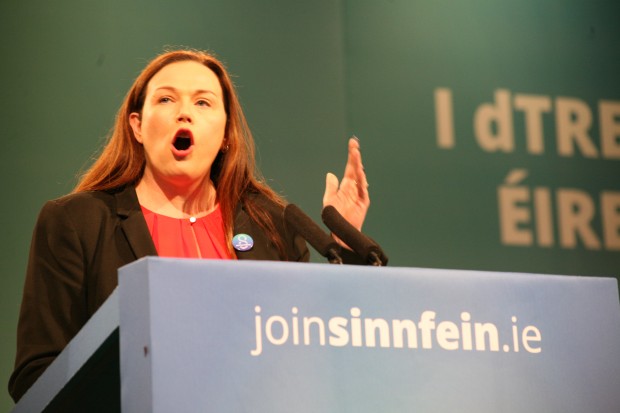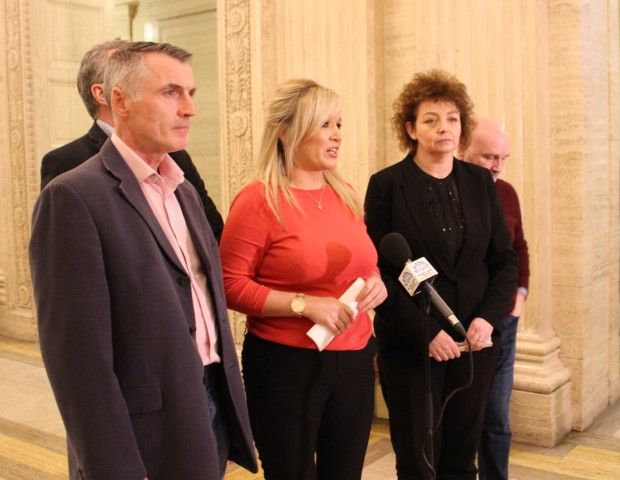20 December 2017
Seven things we have learnt in 2017 (And need to remember in 2018)

"With a Dail election looking more likely next year, it will be Sinn Féin setting the political agenda in Ireland in 2018."
By any measure it has been a turbulent political year in Ireland. The death of Martin McGuinness and the coming departure of Gerry Adams after 34 years as Sinn Fein President is removing two titans of republican struggle from the front line of national politics. Throw in Assembly and Westminster Elections in the North, a new 26-County Taoiseach and you have to admit that the Irish political landscape has changed utterly in 2017. That is even before we get to torturous Brexit negotiations, a stalled Assembly and a raft of referenda coming our way in 2018.
So what have learnt this year? Robbie Smyth picks seven lessons of 2017 as he looks forward to another year of heavy political turbulence and maybe elections South and North again in 2018?
(1) There has been no banking reform
13,000 tracker mortgage accounts, across 15 different banking institutions had been identified by October 2017 as being the latest victims of the Irish banking sector’s aggressive profiteering during the recession years. New estimates are now predicting a final figure of 30,000 accounts unfairly levied higher mortgage payments every month.
According to Central Bank figures 23 families have lost their homes. Sinn Fein’s finance spokesperson Pearse Doherty believes the figure is higher and has harried Fine Gael’s Pascal Donohue all through 2017 on this issue. http://www.sinnfein.ie/contents/46777.
Next add in the cheap debt sell off of €200 billion of loans to vulture funds who have been seeking to evict tenants so they can cash in on the new property bubble. In January 2017 an RTE documentary highlighted this scandal. Going into 2018 we are no nearer to any resolution on this crisis. Nearly 90,000 mortgage holders have seen their debts bought by new financial concerns looking for a quick return on their investments. You can access Ian Kehoe’s The Great Sell Off documentary here: https://www.rte.ie/player/ie/show/the-great-irish-sell-off-30004491/10671887/.
Finally in 2017 there was the collapse of trials and probes into alleged corporate malpractice at Anglo Irish Bank. Anglo needed €29.3 billion of a taxpayer bailout after their 2008 collapse. However this year an ineffective and underfunded Office of the Director Corporate Enforcement (ODCE) saw two of their cases collapse in court.
New Business Enterprise and Innovation minister Heather Humphreys has promised a replacement for the ODCE, but will not publish a completed report on the collapsed Anglo trials. So you can see in 2017 that despite the recession and the collapse of the Irish banking system in 2008, with a subsequent total bank state bailout of over €64 billion that nothing has changed in the regulating the financial sector in Ireland.
(2) Government policies on health have failed
407 people were recorded by the Irish Midwives and Nurses Organisation (IMNO) as being on hospital trolleys waiting for admittance onto a hospital ward in the third week of December. In October data from the National Treatment Purchase Fund showed 678,800 people waiting for hospital care. Behind these figures is a daily litany of heart breaking cases of suffering from long delays waiting for bed or a delayed consultation, medical scan or test and in many cases, thousands of postponed operations.
In August Sinn Féin TD and party health spokesperson, Louise O’Reilly, launched a new Sinn Féin initiative on tackling hospital waiting lists. O’Reilly believes that the Sinn Féin plan, called Comhliosta, will ‘actively transfer those on the list from hospitals that are failing to meet the target to hospitals that have the ability to offer the service on time’.
“Under Comhliosta, patients would see increased funding for hospitals which would be directly linked to reducing public waiting lists, providing a clear incentive to treat more patients”.
O’Reilly believes that; “There isn't a family in Ireland currently unaffected by the crisis of hospital waiting lists. Statistically speaking, one in every seven Irish people are on a waiting list across the State. This failure in easing the burden on waiting lists continues to undermine the fantastic work of staff in our hospitals”. See: http://www.sinnfein.ie/contents/45954.
Current Taoiseach Leo Varadkar owes some of his current popularity to a perceived reputation for plain speaking. As a former Health minister he was quick to appear on radio and TV news media broadcasts offering his solutions for Ireland’s ailing health service. Yet since becoming Minter for Health in 2014 the crisis in the sector has worsened.
Last words here to Louise O’Reilly who aptly summing up the Varadkar legacy on health in November said; “This crisis is the result of successive Health Ministers, including Leo Varadkar, failing to invest and failing to plan. It is the legacy of his time in the Department of Health.
"Under his watch in the department, targets were missed, record numbers of patients were left on trolleys, he oversaw botched recruitment schemes, soaring waiting lists and abandoned universal health care and perpetuated the drive towards the privatisation of the health service.
"He is now the Taoiseach, the buck stops with him and indeed he was very clear when he was selected to lead Fine Gael that he would be taking a special interest in health”.
(3) The housing and homeless crises will get worse
Rising house prices, building costs, rent and homelessness. These are the multiple sides of the housing crisis in Ireland in 2017. Daft.ie have reported that house prices are rising by €50 a day in 2017 and that rent increases in 2017 are averaging 11.7% for the year so far.
As the number of homeless people breached the 8,000 mark in 2017, Taoiseach Leo Varadkar proclaimed that “Ireland has one of the lowest homelessness (rates) by international standards compared with our peers – they’re the stats, we can provide them for you”.
It took Sinn Féin’s Eoin O’Broin to provide the definitive response. In a series of tweet O’Broin said; “This isn’t true. The Government only counts those in emergency accommodation and rough sleepers. Others include all homeless people, including sofa surfers, involuntary sharing in unsuitable conditions. The Taoiseach shows his incompetence yet again!”
Nothing has fundamentally altered on tackling the housing crisis in 2017, and in 2018 expect the Fine Gael government to spend another year not grasping the reality that the housing crisis in Ireland can only be solved by the twin tracks of taking on the profiteering developers and creating a mass state run quality housebuilding programme.

(4) We need to talk about equality
The absence of equality of treatment is one of the key issues underpinning the collapse of the power sharing executive in the north of Ireland. Yet for the political and media establishment in it is the hardest word to say. Alternatives included “power vacuum” in the New York Times, “impasse” in the Economist, “break down” on RTÉ news.
It was masterful how the news media found new ways to discuss the refusal of the DUP to honour the commitments of the Good Friday Agreement and other accords which are rooted in the recognition of equality and a rights based approach to the formulation and implementation of Northern Assembly policies. At the same time during the year Sinn Féin representatives were continually attacked in opinion columns, and on the radio and TV shows for not just signing up to a deal with the DUP.
“A shirking of responsibility” was the headline in one Irish Times editorial and aptly sums up the paper’s attitude to reporting on the Assembly. The Times found space to ask “whether the Democratic Unionist Party and Sinn Féin are more interested in getting the better of each other that in representing the people they were elected to serve”.
The paper did acknowledge that Sinn Féin supported a “rights based society” and that the talks had broken down over “the failure to agree on an Irish Language Act, same sex marriage and a bill of rights”, but the Times cannot get past its own partitionist attitudes to recognise that the very values it champions day to day in its features and opinion columns will stop at the border!
The Sunday Times took a similar line in its editorials, one proclaiming that “Sinn Féin risks being side-lined with its Stormont stalemate”. The editorial lists the range of DUP failures but still concludes that “fault for prolonging the impasse now lies with Sinn Féin”.
The irony in this media pack reporting policy of “If in doubt blame Sinn Féin” was that when the Brexit negotiations crashed in early December, it was entirely the fault of the DUP. Don’t hold your breath in 2018 expecting the DUP to rapidly change tactics or the media to stop blaming Sinn Féin.
(4) Presentation versus conviction
Spin, photo ops, sound and video bites, tweets and Facebook posts: 2017 has seen a nadir in political communication from Trump’s tweets to Leo Varadkar’s new ‘cost neutral’ €5 million Strategic Communications Unit.
The need for politicians to communicate with voters is the platform of democracy. The excessive packaging and control of political communications is the trapdoor through which effective political debate has at times fallen through this year.
2017 has seen vastly different approaches to how this can be done. You have the presentation photo ops including Varadkar’s changing socks and his penchant for turning up in high vis jackets in contrast to the downbeat simplicity of Jeremy Corbyn’s conviction politics.
In 2018 communicating effectively and honestly with voters will be more important than ever. 2017 has shown two clear roads. It can be politics with passion and conviction or campaigns based on divisive prejudice, racism and lies. We need to move beyond the politics of who gets up first in the morning!
(6) Its about wages and prices profit and dignity at work
Trade union issues were a feature throughout 2017, bus and train drivers, nurses, teachers, Tesco workers, and now pilots all found themselves in conflict with employers this year. In 2018 I believe the pendulum will swing more towards private sector workers.
The Fine Gael led government have promised to introduce legislation belatedly on banning zero hour contracts, but at the heart of working life in Ireland is the excessive cost of living compared to other EU states.
Wage rises have been low for those lucky enough to get them while the cost of renting or buying housing has soared year on year. When you add in higher transport costs, health insurance increases annually you have working families in Ireland experiencing a year on year dilution in their standard of living.
It would be great in 2018 if the trade union movement could generate a solidarity campaign between all workers. It is one economy, one island and we all have a right to a living wage and a just standard of living.
(7) Sinn Féin are the dynamic of change
Throughout the year it was Sinn Féin campaigning throughout the island that demonstrated more than any other party that they are the dynamic for positive change in Ireland. On housing, health, agriculture, community development, the economy, reform of the state’s dysfunctional structures and constitutional change it has been Sinn Féin TDs, MEPs, Senators, Assembly members and councillors north and south who have been at the forefront of the campaign for a better fairer Ireland.
Whether it was Garda whistle blowers, the Ash for Cash debacle in the North, the tracker mortgage scandals, housing or health policies Sinn Féin representatives and activists have been there. Have a look at: http://www.sinnfein.ie/policy-document-archive.
With a Dail election looking more likely next year, it will be Sinn Féin setting the political agenda in Ireland in 2018. Remember you heard it here first!





